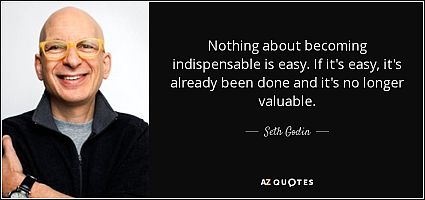Periodically, my friend, Martin Schmalenbach, and I have conversations on the state of “Value Co-Creation,” and selling. Recently, Martin brought up the concept, “Are you an indispensable partner?”
My mind started going crazy with the potential of the concept of being an Indispensable Partner. I’m still formulating my thinking on this, but in the spirit of provoking a wider conversation, here are some thoughts:
How’s this different from being a trusted advisor? We face huge challenges in becoming “trusted advisors.” Too often, sellers don’t care, just playing the numbers game, perhaps remembering P.T. Barnum’s quote, “There’s a fool born every moment.” The level of trust necessary varies, primarily based on the risk perceived by the customer. If it’s a low risk problem, that is the impact of making a bad decision has low or no consequences to the customer, there has to be some level of trust, but not very high. For example, in choosing a restaurant for dinner, I want a pleasant dining experience and to avoid getting food poisoning. But if I don’t have a great experience, I might, if really annoyed, leave a bad Yelp review. Most likely, I’ll probably never go to the restaurant again. But the consequences to me, for that bad decision, are relatively small.
But, if I’m making a decision where I might lose my job, put my company at great risk. Or something that has serious financial, reputational, or other consequences. the level of trust is much more critical.
But think about B2B buying. In reality, trust and trustability, are table stakes. After all, is a buying group going to seriously shortlist a supplier they don’t trust? Are they going to consider a supplier that is known not to deliver on their promises, to have bad quality solutions? Absolutely not! While there will be variability across suppliers, no buyer will consider a supplier that doesn’t meet some threshold of trust.
So what does it mean to be “Indispensable?” Why is it important?
Most of us seek to engage customers “for life.” We constantly focus on retention/renewal. We want to expand our relationships with our customers, finding new opportunities to work with them. When they look at new challenges and situations, we want to be the first they contact. Even when our customers move from company to company, we want them to reach out when they face challenges we address.
To achieve this, we have to become, “Indispensable.” It’s a view that regardless of the outcome of any particular decision, we seek the views and help of certain people/organizations. These tend to be driven by shared interest and not self interest. Those that help us think differently, to imagine new possibilities. They care about each other and what each wants to achieve. They are the people/organizations, regardless the situation, can be counted on to co-create value.
And while in business opportunities, periodically, these indispensable partners may not be selected, most likely they are selected more often because what they do is so tuned to the needs/outcomes required, they become the natural solution.
In a purely transactional world, perhaps indispensability is not important, establishing trust may be sufficient. But in a complex world, where we are constantly challenged, where don’t have all the answers, where FOMO and FOFU dominate much of what we do, we want relationships with a few that we can always count on.
In our personal lives, we have (hopefully) people that we can always count on, that we can reach out to, regardless the situation. In our professional lives and businesses, we seek similar relationships. The people/organizations we can always count on.
If we look at the ultimate in value co-creation, it may be achieving a level of indispensability.

Leave a Reply